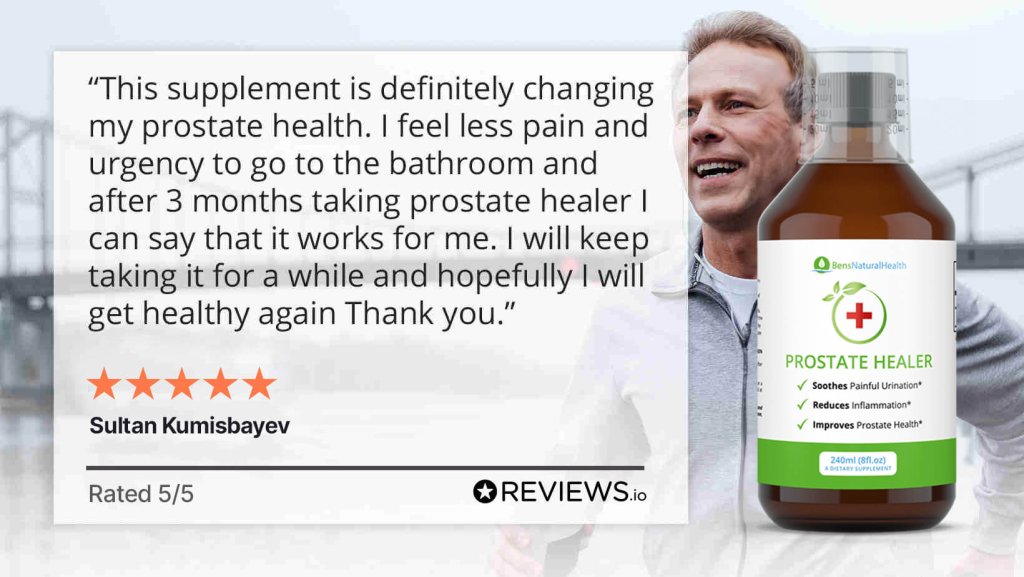- What is a decompressed bladder?
- Should your bladder be decompressed?
- What are the symptoms of a decompressed bladder?
- Ben's Prostate Healer For Bladder & Prostate Health
- What causes a decompressed bladder?
- Risk factors for bladder decompression
- What is the treatment for decompressed bladder?
- Conclusion
- Source
Acute urinary retention (AUR) is a classic urological emergency.
Over 5 years, roughly 1 in 10 men older than 70, and 1 in 3 men in their 80s, will struggle with AUR.
This condition is less likely to affect women. Around 3 in 100,000 female patients develop AUR.
Managing urinary retention often starts with bladder decompression by catheter.
A doctor inserts the catheter at a hospital or general practice. The patient then comes for follow-up treatment if necessary.
Standard treatment for AUR typically relies on gradual bladder decompression. (1)
But, what does a decompressed bladder mean?
Should I be worried if I have a mildly distended bladder?
How does bladder dysfunction affect decompression?
Here is a quick look at what a decompressed urinary bladder is.
What is a decompressed bladder?
The word decompress means to curb or relieve the pressure on something. So, the bladder is decompressed when it is empty.
It can happen with urine leakage in patients with overflow incontinence or through normal urination.
Doctors can use a catheter to keep a bladder in a decompressed state. Bladder catheterization can help monitor a patient’s post-operative (after surgery) or intraoperative (during surgery) volume status.
So, what is urinary retention, and what does it have to do with bladder decompression?
Urinary retention is a condition that hinders the patient from completely emptying their bladder. Doctors who need to address this medical complication can do it with bladder decompression via catheter insertion.
Regardless of the type of bladder neck obstruction, whether from infection or neurological complication, or side effects from prescription medications, catheter use can help.
Those who suffer from chronic retention of urine can use self-catheterization. It can help to keep a fully or partially decompressed bladder.
Get your FREE bladder diary
- Daily bladder diary
- Better understand your urinary symptoms
- Step-by-step guide
Should your bladder be decompressed?
If your doctor suggests it, then yes. But, after drainage by catheter, complications like post-obstructive diuresis (prolonged urine production), hypotension (low blood pressure), and hematuria (blood in the urine) can happen.
And the odds of these complications were believed to increase when the bladder is quickly decompressed. Although some studies support gradual decompression to avoid complications, research is lacking. As a result, complete and rapid bladder emptying is often recommended.
What are the symptoms of a decompressed bladder?
People are interested in decompressed bladder symptoms. When someone has acute or chronic urinary retention, their bladder can still feel full after they pee. That’s mainly due to not emptying the bladder all the way.
A doctor can suggest an ultrasound if you have any of these symptoms:
- Trouble urinating
- Waking up at night to pee
- Unintentional passing of urine
- Pain in the abdomen
- Slow urine flow
- Feeling as though the bladder is always full
Catheters can drain the bladder if you have bladder neck compression, retained urine, or other ailments, like a spinal cord injury or multiple sclerosis.
The insertion can be very uncomfortable – and this is to be expected. While you wear the catheter, you might feel as though the bladder is completely full, and you need to go.
When you turn over or pull the tube, you can also feel discomfort. This is also normal. But, if there are any symptoms, like sharp pain, itching, or burning sensations, talk to your doctor.
Ben’s Prostate Healer For Bladder & Prostate Health
Prostate Healer is a safe, proprietary, unique blend of the world’s 9 most powerful prostate healing and rejuvenating herbs.
Ben’s Prostate Healer is formulated to fight against prostate diseases like prostatitis and BPH, protect bladder health, provide symptomatic relief from urinary tract infections, and reduce inflammation.
It works on the prostate, kidney, and bladder simultaneously, coaxing cells gently to resume normal function.
If you’re like many men that use the formula, you’ll see a reduction in the number of times you get up to go to the bathroom to urinate, plus see an improvement in the flow of your urine.

Decompressed vs distended bladder
It is important to distinguish decompressed from a distended bladder. A distended urinary bladder is a term to identify urinary retention in the bladder due to its inability to void fully. The classic distended bladder causes often include loss of tone or obstruction in the bladder muscles.
Patients with this kind of urinary bladder problem often feel pain. They also have an urge to urinate, even when their bladder is empty.
That’s because the swelling adds pressure to the bladder. To manage the bladder dysfunction, doctors can suggest catheterization.
What causes a decompressed bladder?
Decompression haematuria can happen right after urethral catheterization. And this occurs due to a sudden drop of pressure in a damaged bladder, a case report shows (2).
To understand what causes a decompressed bladder, it’s important to know why doctors suggest it.
Health problems like urinary retention often require bladder decompression via catheterization. The causes of urinary retention include:
- Obstructive complications (i.e., prostate enlargement, organ prolapse, bladder neoplasm, prostate cancer, etc.)
- Infectious and inflammatory complications (i.e., prostatitis, balanitis, cystitis, etc.)
- Other (i.e., penile fracture, penile trauma, post-partum complications, pelvic trauma, etc.)
Risk factors for bladder decompression
It’s also useful to know the urinary retention risk factors. Men are more prone to distention of the bladder. The older you are, the bigger the risk of retention.
Evidence shows those with diabetes mellitus and a history of hypertension are also at a higher risk. (3)

What is the treatment for decompressed bladder?
Acute urinary retention treatment includes regular doctor consultations and self-care treatments.
Physical therapy
To start bladder distension treatment, experts often suggest physical therapy. When you are not emptying your bladder fully or you are trying to avoid complications of urinary retention, it’s important to work on stretching the pelvic floor.
Options like Kegel exercises can help the muscles and nerves function better. You will also train the bladder with timed voiding. This means peeing at specific times to keep the bladder from becoming very full.
Lifestyle changes
After using a urinary catheter clamping protocol, your urethra and bladder will be weak for 2 days. To treat the discomfort, you shouldn’t push or put too much effort when urinating.
Also, don’t strain the body to release a bowel movement. Take your time when using the restroom.
Over-the-counter medications
If you experience any complication of urine retention, like blood in the urine or very low blood pressure, contact a specialist. They might suggest you use over-the-counter medications based on the ailment you are experiencing.
Supplements
People also want to know how to help urine retention naturally. Some of the popular urinary retention natural remedies include nettle. It provides anti-inflammatory and antiviral properties.
Thanks to the phytosterols it contains, the herbal remedy can relieve the symptoms of benign prostatic hyperplasia, case studies indicate. (4)
Other home remedies for improving bladder function are taking warm baths or showers and drinking caffeine-free fluid.
The warm water can help relax the bladder muscles while managing the diet can give the organs the necessary nutrients to work properly.
There are also bladder irritants that you should steer clear off. These include spicy foods, alcohol, and caffeinated drinks.
Sit on a comfortable cushion when working to reduce the pressure on the bladder. And avoid doing activities that put pressure on the prostate, like bicycling.
Many patients turn to supplements and acupuncture to get their bladder back on track.
Those who deal with pelvic floor dysfunction, like incontinence, tend to use vitamin D. For enlarged prostate, saw palmetto is one of the most popular supplements on the market.
Whereas with poor nerve and muscle function, magnesium supplements can help.
But, talk to a doctor first before adding any supplements or herbs to your diet. Your doctor will suggest what your body lacks and which treatment option can work for you.
Get 10% Off Our Products!
- Sign up to our newsletter
- Get Your FREE PSA Lowering Diet Plan
- Be the first to hear about sales and promotions
- Stay up to date on our latest health news
Conclusion
A decompressed bladder means emptying the bladder. It can be decompressed when peeing or through leakage.
Doctors suggest decompression when patients have problems emptying their bladder normally. These patients could be struggling with persistent or acute urinary retention. If the bladder involuntarily decompresses, then patients can do Kegel exercises or take prescription meds.
Kegels are a practical way of training the bladder. Patients will need to go to the bathroom at a timed interval, for example, every 2 to 3 hours.
The more time and effort you put into training the bladder, the more effectively you can alter your urination habits. This can be beneficial for weak or overactive bladders.
But if the medication you are taking is causing side effects, then talk to a doctor. They will most likely change your prescription medicine.
Explore More









